Nigel Bird's Blog, page 63
May 9, 2012
Dancing With Myself: BRIAN LYZER interviews BRIAN LYZER
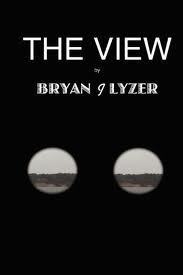
When did you begin writing? About twenty years ago. I remember the day clearly. I had a moment of inspiration on a Saturday morning and started typing on my computer. Eight hours later I had a hundred pages of an outline. The amazing thing was how fast the time went by and how engrossed I got into my own story. More than one reviewer has stated that THE VIEW should become a movie. What do you think about that? I take it as a very nice compliment. In a way it makes a lot of sense to me because I sort of see the story visually in my head long before I write. As a matter of fact I consider my self a storyteller more than a writer. I also knew the last line of the book very early during the process. Interesting. Any other insights into your writing process? Just that I try to get everything I think about down on paper as quickly as possible. I don’t worry about whether something works or not. It’s important not to over think things early in the process. As an example, I had well over 500 pages which eventually was trimmed down to just less than 300, but I love that process. It’s amazing to create something out of nothing and then sculpt it down to a polished story. Who are your influences? There are so many I’m afraid of leaving one out, Robert Ludlum, Stephen King, John Irving, Ken Follet and James Patterson, all different styles, but each enjoyable reads. What made you decide to self-publish?
 I did try sending the query’s to agents at first, but it felt like I was working too hard for too little results. I think it would be nice to have a traditional publisher though. Writing is a lonely enough business and I think it would be fun to be involved with other people as long as they truly believed in my book.
Are you working on anything new right now?
A children’s book and then another fictional novel, but unfortunately I do have a regular day job and can only progress so fast. I guess that is one of the benefits of self-publishing. I can do everything on my own schedule.
I did try sending the query’s to agents at first, but it felt like I was working too hard for too little results. I think it would be nice to have a traditional publisher though. Writing is a lonely enough business and I think it would be fun to be involved with other people as long as they truly believed in my book.
Are you working on anything new right now?
A children’s book and then another fictional novel, but unfortunately I do have a regular day job and can only progress so fast. I guess that is one of the benefits of self-publishing. I can do everything on my own schedule.
Published on May 09, 2012 14:52
May 4, 2012
Stairway to Heaven: Dan O’Shea goes dancing with himself
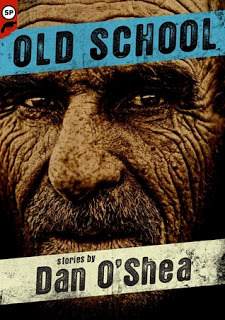
Excuse me a moment. *Turns around and slaps own face* Geeze, just because Nigel put on Stairway to Heaven doesn’t mean I get to grope my own ass during the slow bits.
Stairway, eh, Nigel? Damn, that’s better than eight minutes, and that’s the radio version. Not letting me off easy, are you old sport? Couldn’t go with something hard and fast, get this over with? Maybe The Jam, Eton Rifles maybe? Let me show off my anglophile chops, transition into a nice Occupy Wall Street groove, do a little socio-economic two-step, a little geopolitical rag, try for some 1980s nostalgia just to make myself look a tad younger? No, huh? You’re going for the jugular, gonna make me show my age, eh? OK, time to bust a move. Dancing with Myself.
I’m suspicious of this whole exercise, frankly. I mean look at these puppies – these are big dogs,13Ws. And I don’t mean in those whacky-ass European shoe sizes either, Nigel. I checked the conversion chart. 45s? Really? That’s a handgun caliber, not a shoe size. No, on me we’re talking 13W worth of good ol’, god-fearin’ American shoe leather. The problem being, you can’t start slinging gunboats like these around the dance floor without stepping on a few toes. But there are advantages, of course. Yes ladies, I did say 13 wides. *wink wink*
Not that I can’t pull off a little fancy footwork. Did some boxing back in the day, strictly amateur hour stuff, but still, I laced ‘em up and climbed into the ring a couple dozen times. And your fists won’t go anywhere your feet don’t take you, even if you are known around the gym as the even-whiter-and-less-talented Jerry Quarry. So yeah, I can move the tootsies a little. And I can take a punch, but you knew that already. You’ve seen my face.
Crap, the slow part’s over. Bonham’s really pounding the skins now, Jimmy Page is firing on all cylinders, all that mamby pamby Hobbity shit, the rings of smoke through the trees shit, that stuff we were trying to digest down in Brian’s basement, lubing up the process with a case of Old Milwaukee because, god damn it, we were pretty sure some sort of paradigm shifting universal secret was stashed in there somewhere, we’re past all that now. Now we’re winding on down the road, our shadows taller than our souls, the tempo cranked all the way up. Time to let go of my date, break out of that feel-up clinch and shake it. But we didn’t used to, not at the dances in the school gym, not back in ’75. Of course, we weren’t listening to Bonham on the drums, that wasn’t Jimmy working the ax. Just some guys in bad polyester shirts and worse heavy metal hair, guys with maybe five years on us, but not guys who’d been to our school. Guys with day jobs at Caterpillar, or maybe down at All-Steel, Guys that ran drill presses Monday through Friday, guys that stamped metal. Guys with enough left in the tank after all that to get together in the garage, work up a playlist, waste their passion on a mess of 16-year-olds who stayed in that graceless four-armed circle-stomp clinch all the way through the fast part because we weren’t even hearing the music, just the blood in our own veins, just that voice in our own heads that kept telling us maybe tonight maybe tonight maybe tonight. Or maybe not. Usually not. Didn’t matter. Not our awkward gyrations, not our clumsy innocent pursuit of our pubescent fantasies. Didn’t matter to us, not on the gym floor at Marmion Military Academy.
Because it was all still ahead of us, we knew that. College, jobs after college. And not running drill presses either, jobs with ties. We had nothing on the line. But those guys on stage did. Not just another Saturday night for them, not in their heads. They were dreaming of filled arenas, limos, t-shirts with their names on the front and tour dates on the back. They were up there doing the one thing in their lives they loved at the end of a week they probably hated so that we could ignore them and turn in our masturbatory little circles wondering if this was the night we’d find out what color panties Mary Mulcahy was wearing.
Those guys, they were playing with desperation because they knew that they had maybe another couple of years. A couple years left to pretend that some guy from A&M was going to hear them playing a soc hop in East Bumblefuck, Illinois, was gonna give them that mythical break. A couple years before some girl in a bar became more than some girl in a bar, became a wife, became a mother, and then they wouldn’t have time for the garage, time to work this year’s new sound into the playlist and they’d put away the ax with the rest of St. Paul’s childish things. Maybe take it out late at night sometimes, just working the strings, not even plugging it into the amp, not wanting to wake the kids, trying to convince themselves they still have some magic in them somewhere, or at least that’s how I picture them, say nine years on, in 1984, the third baby on the way, the mortgage payment late because the holding company that bought out the plant had packed it up for some non-union spot down in Mississippi and the unemployment had run out and they had to shut off the tube when that Regan commercial came on again, the one that said it was morning in America, so then they were sitting there alone in the dark and they had to reach for something, so they reached for the guitar. Maybe called up some old friends, maybe got the band back together, maybe played some weddings or something, not chasing dreams this time, just making ends meet.
Somewhere down in Mississippi, somebody else is reaching for the guitar now. Not picking through old Zeppelin tunes, probably. Drive By Truckers maybe, old Skynyrd tunes maybe, Tom Petty maybe. Because now the plant’s packed off to China, and it would take four shifts a day at Walmart to make up that paycheck, but Walmart’s only hiring part time because full time would mean paying more benefits, so its five hours a day in the blue vest unpacking the boxes from Shanghai, throwing the shit they used to make on shelves for a quarter of what they used to get paid, then shucking the blue vest for six more hours of pushing shopping carts around the lot at the Food Giant, and Obama’s on the tube telling them Hope and Romney’s on the tube telling them Obama’s the anti-Christ, and they’re pretty sure it isn’t going to matter much to them either way.
What’s that Nigel? The music’s stopped? I guess I didn’t notice again, guess I wasn’t listening. Guess my mind was somewhere else. I wish it was still on Mary Mulcahy’s panties, but I know what color they were now. Sometimes I think that was the last good thing.
But hold on, don’t throw it to the judges yet, let me see if I can’t work up a little paradiddle, go out on a high note. *a slow, pathetic shuffle, muscle memory gone all Alzheimer’s*
Fuck it, who am I kidding? I’d pull a groin.
Dan O’Shea is a Chicago area writer represented by Stacia Decker at the Donald Maass Literary Agency. His short fiction collection, Old School, is available through Snubnose Press, Amazon (UK) and Smashwords. On days when he remembers he has a blog, you can catch him at www.danielboshea.wordpress.com .
Published on May 04, 2012 03:31
May 2, 2012
One Man's Opinion: The Diving Bell And The Butterfly
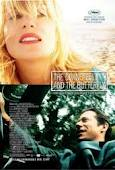
When I bought my copy of The Diving Bell And The Butterfly it was for research purposes. I intended to write about (and am writing about) someone with locked-in syndrome.
To help me decide that this was the book for me, the publishers had generously placed on the cover the recommendation from someone at the FT who had said it was 'one of the great books of the century'.
It's certainly a very moving book and, should you want to dig into what is said, a profound one. Reading about someone who can't move their body, has hearing issues and can only use one eye (for seeing and for blinking out the story) it's difficult not to think about life and it's many facets.
The story is a surprisingly light read in many ways, a very easy and gentle passage from beginning to end. The style is descriptive and personal, yet slightly removed from real anguish and joy. Hard not to be impressed by Bauby's philosophical stance.
Here's a quote about when he first sees his reflection after the massive stroke that left him in his condition:
'Not only was I exiled, paralysed, mute, half deaf, deprived of all pleasures and reduced to a jelly-fish existence, but I was also horrible to behold.'
There's a rather dry humour in the statement and it's a humour than runs right through the piece.
My favourite chapter is about Bauby and a colleague of his who spend a day at the races. The newspaper they run has a sports reporter who knows his horses and the whole of the office is relying on the duo to get their bets down for the big event. The section tells a lot about who Bauby was before the stroke as well as much about how he was afterwards.
I was struck by the tenderness and also by the absolute frustration of a man who has young children and how the love they share is tested and stretched. Not to mention that he knows he shan't see his father again - young Bauby is in his prison and his dad is too frail to leave his apartment.
There's a reminder right through this that whoever we may be, it's likely that there'll be a time when all our memories are distilled into short measures. The people we have been will have faded and we'll have to manage to make the most of what we are left with and what we remember. It's a reminder that when a person is wheeled passed us that however misshapen or twisted the body might be, the mind might be sharp and active on the inside. And if we need to treat the most vulnerable members of our world with respect, shouldn't we also try and apply such principles to everyone?
I work in a school with an 'Exceptional Needs' unit and try to be smiley and positive every time I see the kids there. What I feel I need to do from now is to take that a little further in terms of the communications I offer.
Another thing occurred to me as I was reading. It provided an excellent mirror to hold up to Stona Fitch's excellent 'Senseless', highlighting just what a well-written tale that is.
It took only a couple of hours to complete and is broken into very neat chapters (I guess the act of blinking out a story is exhausting), but I'd recommend it to anyone who's feeling a little sorry for themselves, anyone who likes descriptions that border on the poetic and anyone who has ever wondered just how bad a Sunday can get.
It's not even close to being the greatest book of the century. Maybe not even that close to being the best book of its year, or even month. Still, I think you might benefit from a read of it. Digest it and go out there and try and make the most of your day. I for one will be trying.
Published on May 02, 2012 07:31
April 29, 2012
One Man's Opinion: THE CRIME INTERVIEWS (volume 1) by LEN WANNER
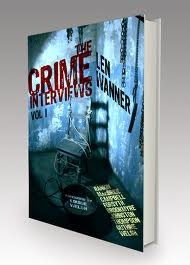
Though it doesn't say anything about the book, this was the first I'd chosen to read entirely on my android phone. It seemed perfect for such an experiment given the natural breaks and I must say I enjoyed using the device much more than I expected.
'The Crime Interviews 1' is such a good idea and it's very well executed.
Len Wanner has interviewed some of the heavyweights of Scottish Crime fiction and presented them in a very engaging way.
It's clear that Wanner knows his subject and he has done a huge amount of research before each one.
The interviews seem very fluid, linking questions together very smoothly as Wanner dances around making sure he exposes all openings without being pushy. There are core questions that he broaches with all those involved (Ian Rankin, Stuart MacBride, Alice Thompson, Neil Forsyth, Allan Guthrie, Christopher Brookmyre, Karen Campbell, Paul Johnstone and Louise Welsh) which reveal Wanner's academic leanings and perspectives and there are those designed for the individual which reveal the human touch.
We get to consider writing from the point of view of the auteur as well as from being given the opportunity to think about how the individual work is a reflection of society and where it fits in to a scheme of literature with a substantial history.
I felt like the interviews took place in relaxed settings and that the interviewees have utterly trusted their interrogator. I suspect that the quality and the nature of the answers also demonstrates the respect that the subjects have for Len Wanner and his understanding and knowledge of and about the genre.
As with collections of any kind, some of these I enjoyed more than others.
Rankin and MacBride are great choices to open the book. I'd like to offer a special word for Alice Thompson's which I was a very pleasing surprise. Icing on the cake though, was always going to be Allan Guthrie for me and I was delighted by what I found.
No matter which author you prefer, each interview is long and detailed enough that you'll feel you got your money's worth and more besides.
If you're a fan of crime fiction, you're a student of the genre or a writer hoping to pick up some tips on your craft, this is a book you'll get a lot from.
Published on April 29, 2012 08:51
April 28, 2012
One Man's Opinion: HIT AND RUN by DOUG JOHNSTONE
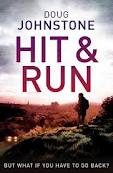
Billy’s driving home, a gut full of beetroot vodka and of the pills his brother nicks from the hospital. Course he shouldn’t be doing it. No wonder then, that when he knocks over a pedestrian in the early hours of the morning he feels responsible. A lump rises on his head and the guilt rises just about everywhere else.
They move the body, go home, take more pills and sleep it off.
Next day, Billy is called to the scene of a suspicious death, a possible jumper from Edinburgh’s Crags. It’s not a jumper though, it’s the victim of Billy’s driving who managed to get to the bottom of the cliff before his body gave up on him.
Billy’s there in his role as a newspaper’s novice crime reporter. His mentor, a seen-it-all-before kind of woman called Rose, finds out the name of the dead man; it’s one Frank Whitehouse, Edinburgh’s big, bad wolf.
From this point on the story is simply thrilling.
Johnstone writes with a fairly spare style, yet manages to explore a range of issues to the full.
It’s a very visceral book.
I was reminded many times as I read of the pleasures of being young and of alcohol and drugs, and I’d like to thank the author for some of the flashbacks he induced.
All the experiences are through the mind and body of Billy, the man who earns the nickname ‘Scoop’ from his older hack partner due to his success in getting incredibly close to the case. There are shades of pain I don’t think I’ve even contemplated before. The smells and sights of the city bring the scenes to life. It’s so well written that at times I felt I was inside Billy’s skin, and inside Billy’s skin was rarely a good place to be.
This book is fast-paced, yet thoughtful. Everything happens in a short space of time within a small area of the city. The world outside is full of pressure and, on the inside, the pressure inside Billy’s head builds to a crescendo.
I came out of the end of the ride fully satisfied.
I’d suggest it’s a kind of Hard-Boiled ‘Crime And Punishment’ for the post-ecstasy generation, the love-child of a Dostoevsky/James M Cain/ Allan Guthrie triangle.
The characters are brilliantly drawn and explored. What I like about the way they are brought to life is that it’s not because of the wedging in of detail that we come to know them, rather it’s through their interactions. The ways they bounce off each other. Boss and underling; boyfriend and girlfriend; two brothers; one man and his dog; lovers; feuding gangsters; dead and living; car and driver...
In particular, I think Billy and Rose are a brilliant pairing. Either of them would make ideal characters for future books and I’d certainly rush to read any story Doug writes where they’re present (if sequels aren’t your bag, how about a short story or a novella, sir?). In fact, this is such a great pleasure of a read that I’ll be rushing to read anything Doug Johnstone put out.
Superb.
Amazon US
Amazon UK
Published on April 28, 2012 01:54
April 27, 2012
"The BRIT GRIT mob is coming to kick down your door with ...
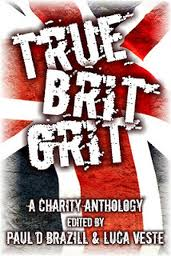
"The BRIT GRIT mob is coming to kick down your door with hobnailed boots. Kitchen-sink noir; petty-thief-louts; lives of quiet desperation; sharp, blood-stained slices of life; booze-sodden brawls from the bottom of the barrel and comedy that’s as black as it’s bitter—this is Brit Grit!"
45 British writers, 45 short stories. All coming together to produce an anthology, benefiting two charities...
Children 1st - http://www.children1st.org.uk/
and
Francesca Bimpson Foundation - http://www.francescabimpsonfoundation.org
The line up...
Introduction by Maxim Jakubowski
1. Two Fingers of Noir by Alan Griffiths
2. Eat Shit by Tony Black
3. Baby Face And Irn Bru by Allan Guthrie
4. Pretty Hot T’Ing by Adrian Magson
5. Black Betty by Sheila Quigley
6. Payback: With Interest by Matt Hilton
7. Looking for Jamie by Iain Rowan
8. Stones in Me Pocket by Nigel Bird
9. The Catch and The Fall by Luke Block
10. A Long Time Coming by Paul Grzegorzek
11. Loose Ends by Gary Dobbs
12. Graduation Day by Malcolm Holt
13. Cry Baby by Victoria Watson
14. The Savage World of Men by Richard Godwin
15. Hard Boiled Poem (a mystery) by Alan Savage
16. A Dirty Job by Sue Harding
17. Stay Free by Nick Quantrill
18. The Best Days of My Life by Steven Porter
19. Hanging Stanley by Jason Michel
20. The Wrong Place to Die by Nick Triplow
21. Coffin Boy by Nick Mott
22. Meat Is Murder by Colin Graham
23. Adult Education by Graham Smith
24. A Public Service by Col Bury
25. Hero by Pete Sortwell
26. Snapshots by Paul D Brazill
27. Smoked by Luca Veste
28. Geraldine by Andy Rivers
29. A Minimum of Reason by Nick Boldock
30. Dope on a Rope by Darren Sant
31. A Speck of Dust by David Barber
32. Hard Times by Ian Ayris
33. Never Ending by McDroll
34. Imagining by Ben Cheetham
35. Escalator by Jim Hilton
36. Faces by Frank Duffy
37. A Day In The Death Of Stafford Plank by Stuart Ayris
38. The Plebitarian by Danny Hogan
39. King Edward by Gerard Brennan
40. This Is Glasgow by Steven Miscandlon
41. Brit Grit by Charlie Wade
42. Five Bags Of Billy by Charlie Williams
43. It Could Be You by Julie Morrigan
44. No Shortcuts by Howard Linskey
45. The Great Pretender by Ray Banks
Published on April 27, 2012 14:44
April 25, 2012
5-2 Blog Tour - ARTICULATING SPACE
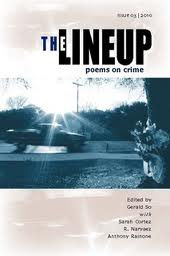
I've deliberately avoided going over to the other posts on the 5-2 tour in case this poem was already chosen. It made more sense for me to just do this and find out later.
By way of an introduction, I'd like to highlight my own favourite 'crime poet'. I doubt he's been called that before, but he writes about injustice and injustice is a crime. In his words he tells stories that can be violent and very hard-hitting, but it's the rhythm that I love - that dub bass line pattern, the holes and the resonance mixing with the staccato. Try this link to Linton Kwesi Johnson and I hope you'll hear what I mean. Or try this one here, or even this one here. Brilliant.
Now over to the 5-2.
I've chosen this poem to think about. It's from The Lineup: Poems On Crime 3
Articulating Space
by Patricia Abbott
The winter after the assault she made
A series of small quilts patterned on Paul Klee
paintings there were difficulties of course
since the books she used for sources
varied in the precise tint of all those little squares
that sometimes looked like bandages strung end to end
also the squares lost their plumb perfection like
a face pummelled out of it's natural symmetry
and other times the squares seemed rigidly square just
the way he liked things and she felt calm
sitting on the floor amongst the pieces for a minute
before she grew frantic that she could ever
get it right with all the piecing dependent
on what seemed to be but weren't random
choices once finished the quilts were different
from her image of the Klees unframed
they seemed bulky and primitive on the white walls
he insisted on and if she framed the quilts they floated
like fragile fiber sailboats on a chintz black sea.
There are so many things to think about when looking at a poem, but for me the first reaction is usually arrived at without much thought at all. It's all about discerning the patterns and the flow and the way it feels as it reads. How the words fit together. Bounce off each other. Hold hands or kick hell out of each other. Architecture with words.
Patricia Abbot gives plenty to savour on a first reading. It has that flow, like the tide, like the sailboats that finish it off bobbing up and down on the waves.
The opening line tells all we need to know about the back-story, the reasons the quilts are being made. It's the winter after the assault. No need to embellish.
Then we come to Paul Klee.
I imagine the author in a gallery one day looking at one of his paintings and experiencing a reaction, logging it for the day a poem might work. What I think she might have seen is the contradictions I feel when I look myself. On the face of things there is order. Neat shapes. Symmetry. Pattern.
Stand there long enough and those initial moments of observation are turned on their head.
What seemed still begins to move, the kind of movement that you can never actually catch. It's a confused movement that almost creates sea-sickness. There is only the illusion of symmetry. An odd shape or choice of colour might single one piece out from the rest. Stability at first becomes unreliability, a bit like I imagine a life might imitate after an assault.
And there's the act of quilt making itself. It would be hard to imagine a more suitable analogy for the reconstruction of a life.
As she works, the assault continually haunts her. There are the shapes 'like bandages'. A 'face pummelled out of its natural symmetry'. There are moments of calm shattered by anxieties about her pieces and the choices that have been made, and with them the responsibilities of choice and maybe the choices of her assailant.
So who was the attacker? The man (?) who shattered this lady's world? I'm not sure, but I'm going for the partner, the man who insists upon the clean white walls and maybe the squares being perfect the way he likes them, as if pleasing him is not just satisfying but essential.
All the time she's put in and they're not quite right. They didn't help her to glue her life back together just the way it was before. They're bulky. Bloated. Her life is as fragile as the sailboats on the sea. For her, the sea might be the eggshells upon she has to walk upon.
That's what I see as the story and, because I'm not an academic, it doesn't matter if I'm right or wrong. It's the way I see it.
The other factors about this piece which I enjoy relate to the choice of words themselves.
You have a lovely flow, gentle for most of the piece. When it comes to the disturbance the words get a little harder and sharper - frantic, dependent, random. To help it along, the smoothing 's' starts and ends and the more bumpy plosives from 'b' and 'p' (almost 10% of the words begin with a 'b' or a 'p', 25% have a strong 's' or 'sh' sound).
There are those slick alliterations: Paul Klee paintings; plumb perfection like a face pummelled; she made a series of small quilts; after the assault she made a; framed the quilts they floated like fragile fiber.
All of these things point to the skill of the writer.
My feeling?
I enter feeling sad that there was an assault. I wish it hadn't happened.
I leave with that same feeling of sadness that life will never be the same, no matter how many quilts are made, sensing that the hidden frailties of being human will forever be within the vision of this woman.
Which is why I like to read poetry - to have my senses and feelings played about with without from a tiny dose of reading.
You can find more poems in The Lineup: Poems On Crime 4
Published on April 25, 2012 23:29
Karo Hämäläinen: Dancing with myself
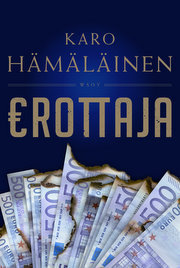
Piles of papers have crowded the table. Somewhere in between is a glass full of tap water, some dozens of pens, a couple of unread books (and some read ones), chewing gum, an empty Pepsi Max bottle and a laptop. It looks like Karo Hämäläinen has forgotten the interview. The photographer and I hesitate at the door.
"Just come in, just come in," he says. "It took me hours to build an impression of working hard and paying no attention to what my room looks like."
As we sit – I on a chair, the photographer on the saddle of an exercise bike standing in the corner – Hämäläinen checks the latest events in the stock market. It's well known that the author is an eager small investor.
"Ok, Karo, at first..."
"Wouldn't you like to say 'Mr. Hämäläinen'?"
"Oh yes, I'm so sorry. I mean... Don't we know each other well enough?"
"Was that your first question? No, we don't."
"No."
"Yes. That was my answer."
"I mean, it wasn't question number one."
"It was. Go on, please."
"Mr. Hämäläinen, you wrote many books before you made your break-through with a financial thriller,
The Buyout . How did you come up with the idea of writing a financial thriller?"
"To be honest,
The Buyout as well as The Bailout are wretched thrillers, because the reader doesn't get what he wants, i.e. fire arms, piles of dead bodies and a happy ending. I call them thrillers as I have heard that thrillers sell better than so called literary fiction."
"But they..."
"Yes, yes, I know. They are very good novels, and yes, I know, I have written them in the form of a thriller. Why is that? Because I love books you can’t put down. I have written many dull books. And read even more. I'm already 35 years old, so I don't have time to write any more of those. In my opinion, you don't have to say good-bye to literary standards even though you write entertaining books. Some might think it's even more challenging to write books that are both deep and entertaining."
"You write literary social novels that are highly entertaining."
"I like your formulation. Although it's mine."
"So what is a financial thriller? How does it differ from an action thriller?"
"Just guess how many times I have answered those questions."
"Fifty-seven?"
"Not bad. Well, in a financial thriller, the things the characters do and the suspense are fundamentally motivated by the investment world. Financial events aren’t just the milieu like in some action thrillers set in the world of high finance; instead, everything in the thriller starts from the logic of money. The characters’ greatest fear is not dying – they’re afraid of something even more important: losing their reputation and their money."
"Your latest novel The Bailout is set in the economic crisis in the Euro-zone. Isn't that a boring theme?"
"Yes, it is. And finance as a whole is boring. You have to be paid at least one million before you start working. For example, gardening is far more interesting. People are willing to do garden jobs for an annual salary of €20,000."
"One of the three main characters in The Bailout is a hedge fund salesman. Have you invested in hedge funds?"
"Oh yes, once. I got mine back. After that, I have steered clear of algorithm miracles."
"You don't believe in hedge funds?"
"I do. They are fantastic instruments that generate piles of bucks to hedge fund managers. But they are disastrous for the investor's wallet. Hedge funds are just speculation and therefore have nothing to do with investing."
"However, investing and the euro crisis are not the main themes in your newest novel."
"That’s true. The Bailout is about people's tendency to behave like the stock market. They pretend to be something they are not. Like you. You act the role of a literary journalist with your pen and your A5 writing block. You try to ask challenging questions. You haven't read any of my books but you give plausible statements about them, because you have eyed some articles and book reviews."
"It's impossible. The Bailout isn't out yet."
"Okay, I think we are finished now. Thank you for your visit. You don't have to send the article to me before publishing it. I'm not interested in what you write. I am hardly interested in what I write myself."
nb
Karo Hämäläinen
(b. 1976) has twopassions: literature and the stockmarket. The first combination of hispassions, The Buyout, came out in2011. Nominated for the SavoniaPrize, it was loved by readers andcritics alike. http://karohamolainen.wordpress.com/in-english/
The Bailout Kolmikulma
(WSOY 2012, 380 pp.)A topical, timely novel delving into the core ofthe European debt crisis.The socialist opposition leader of Hellenia is readyto do his last favour to his fatherland: to sign – andto resign. A young and eager hedge fund salesmanhas his once-in-a-lifetime opportunity toshow his boss what he is capable of. When thepolitician is kidnapped, billions of dollars are atrisk (as well as some secondary matters, such ashuman lives).In The Bailout, people and countries behave likethe stock market: they pretend to be somethingthey are not.
Critics have compared The Buyout to Tom Wolfe’sBonfire of the Vanities!
An intense 23-hournovel in the triangleof politics, crimeand hard finance
Rights enquiries: Elina Ahlback Literary Agency | elina.ahlback@ahlbackagency.com | www.ahlbackagency.com
Published on April 25, 2012 02:18
April 23, 2012
One Man's Opinion: RAMPART AND TOULOUSE by KIRSTIN FOUQUET
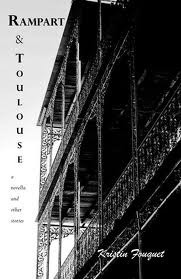
I found out about this book thanks to a writer friend on mine, one whose taste I respect without reservation. He'd picked it as one of his top 5 recommendations of last year, so I had to have a copy.
I'm delighted that I ended up with one.
The core of the book is the novella 'Rampart And Toulouse'.
Rampart and Toulouse it the corner at which a fine old building stands. It holds the charm of its age and is showing signs of wear, a little like a number of its inhabitants.
Into the building moves a young lady, finding the place appealing to her finer instincts as well as to her purse.
Once there, she mingles within the mini-Bohemia in which she finds herself and takes the next step of her journey into growing up.
The story meanders from one new experience to the next, gentle and touching like a warm spring sun.
Not that it's all light.
There's a beautiful photograph on the cover of the book, splendid in its black and white print and in it you can see many aspects of the story which I enjoyed - the subtlety and the clever shades and contrasts that are present throughout and the use of space as an impliment.
The protagonist, Vivienne, is a painter and there is a sense that the author of this book has neatly and carefully stroked all the words onto the page with a careful eye.
I really enjoyed the play between the characters, the sense of nostalgia and of hope and the three-dimensional creation of a New Orleans I'm now even more keen to visit than ever.
It's not one for lovers of hard, fast action, but for anyone who enjoys the shifts that happen in a life when the person isn't looking, this might well be for you. If in doubt, give it a try. After all, you've nothing to lose, have you?
Published on April 23, 2012 11:54
April 20, 2012
Dancing With Myself: TAPANI BAGGE interviews TAPANI BAGGE
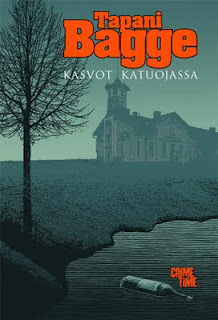
Before kick-off, I'd like to mention that the book My Friend Miranda is free today and over the coming weekend. It's not a crime book at all, but is the story of a young girl growing up. It should work for avid young adult readers as well as grown ups.
Today's interview is a peach. Welcome please Tapani Bagge.
1. You say you’re a writer. What have you written?
I have published over 70 books, among them 14 crime novels, a couple of short story collections, dozens of children’s books and youth novels. I’ve edited anthologies, translated books from English, made scripts for TV, radio and comics and written a couple of stage plays. For the first ten years of my career, I wrote pulp stories for the Finnish Jerry Cotton, and FinnWest, a Finnish western series.
2. Let’s concentrate on your crime novels. What are they about?
I started out in 2002 with Puhaltaja, (The Jack), the first book of Hämeenlinna Noir, so far a six-novel-series about the crooks and cops of my home town. The fifth one, Musta taivas (Black Sky), won the Clew of the Year Award of the Finnish Whodunnit Society and was the Finnish nominee for the Nordic Glass Key Award. It was recently published in German by Suhrkamp as Schwarzer Himmel. We also have a deal for the next novel in the series, Kummisedän hautajaiset (The Godfather’s Funeral). Hämeenlinna Noir books are darkly comic and at times violent. There really is no hero in them, no good guys or bad guys, just people who make wrong choices, sometimes against their better judgement. The cops and crooks are equally human, and one of the cops (Detective Leila Pohjanen) and one of the crooks (police informant and repenting burglar Allu Nygren) are even getting into some kind of relationship, and finally have a baby together.
3. That was then. What now?
I am currently working on two crime series. One is about the hard-luck lawyer Onni Syrjänen of my birth town Kerava, a small railroad community near Helsinki. Onni doesn’t belong to the bar any more, even though he regularly goes to one. Onni may bear some resemblance to the classic private eyes like Philip Marlowe or Matthew Scudder, but basically he’s a loser. In any case, he does his best to stay sober and help his friends, relatives and other clients, who are usually criminals. His paths often cross with characters of the Hämeenlinna Noir novels.
There are two Onni Syrjänen books, Kasvot tuulilasissa (The Face on the Windshield, 2010) and Kasvot katuojassa (The Face in the Gutter, 2011). A couple of short stories starring Onni Syrjänen can be found online in English.
4. And the second ongoing series?
My historical series follows the trials of detective sergeant Mujunen of Valpo, the State Police. The first novel of the series, Valkoinen hehku (White Heat), is set in 1938, when the scars of the Finnish Civil War of 1918 are still fresh. Mujunen tries to solve the murder of a beer brewer´s son and locate some missing documents and a missing male secretary of a German arms dealer. At the same time, there are several assassins plotting a hit on State Minister Kekkonen, who is fighting against the extremists on left and right. The second book, Sininen aave (The Blue Phantom), depicts the summer and fall of 1940, just after the Winter War, when the Finns have to choose between the plague and the cholera, Nazi-Germany and the Soviet Union. A Finnish passenger plane explodes en route from Tallinn to Helsinki. The recently widowed Mujunen starts an affair with a Lithunian danseuse, who may have a hidden agenda, and tries to find her brother. There may also be a big conspiracy or two on the make. A sample of the book is online in English.
5. What’s new?
The third novel in the Mujunen saga, Musta pyörre (Black Whirlpool), is coming out in Finland this spring. The year is 1942 and the choice has been made. Again, Finland is at war against Russia, this time together with Germany. Reichsführer-SS Heinrich Himmler arrives for a visit, and Mujunen is ordered to be his bodyguard. Himmler offers the final solution to ”the Finnish Jew problem”, the underground communists are sabotaging the Finnish war effort and killing policemen, and not one but two femme fatales are entering Mujunen’s life. Things get pretty hectic for him as the story progresses.
6. Who is this Mujunen, anyway?
Mujunen is a man of principle. He won’t hit the suspects to get the truth, because he knows that can distort the truth. He won’t bother to report the rationing crimes, and he frequently resorts to the black market himself. After his wife died during the Winter War, he’s had his share of affairs with sad endings. He’s a reliable workhorse of the State Police, but he’s also a man of conscience. When his bosses fraternize with Gestapo and SS and follow their example in too many issues, Mujunen begins to have his doubts about the justification of his work. Drinking doesn’t help, so he takes action. And if the law is wrong, you have to break it. Or at least bend it a little.
7. Why do you write crime stories?
When I was twelve, my family and I paid a visit to one of my uncles. He was in prison, and he wasn’t there as a guard. He was there for a good reason, but he was still the same uncle – he hadn’t grown any horns on his head.
It was some sort of revelation for me. I understood that the cons are human, too. I try to keep that in my mind when I write.
About that time, I was introduced to the works of Raymond Chandler, Dashiell Hammett and Donald Westlake, and they made a lasting impression. Later, I’ve found many other great crime writers, as well as writers of other genres. I also like humour in my books. In my own crime novels, it’s mostly black and sometimes absurd. My take on life.
8. Why do you write about history?
We humans seem to make the same mistakes again and again. Maybe it’s too late for us to learn anything from the past, but you can find some great stories there.
9. Why don’t you write about criminal masterminds?
Simply because there aren’t too many of those around. When I was in high school, one of my pals decided to rob the post office. Until then, he had been a pretty decent guy, he even
coached soccer juniors. Maybe he had some money problems. Anyway, his robbery was a classic: he made almost all the mistakes one can think of. He borrowed a target pistol from a friend, rented the getaway car on his own name, went to the post office where his girlfriend (later on, ex-) was behind the counter, got some money, left the getaway car with doors open in the parking hall of the local department store, and was at home counting the money when the cops arrived. On his way home, he had even dropped in at the pub to brag about his deed.
In real life most criminals are sad cases. I have no idea where all the criminal masterminds in fiction spring from. Probably from other books and movies.
10. What’s next?
Next, I’m writing the fourth and final novel about Mujunen, titled Punainen varjo (Red Shadow). It is set right after the Continuation War, with the Second World War still raging elsewhere in the world. The Russian Control Commission casts a big shadow over Finland. Mujunen is now head of the counterspy department in the State Police, with new leaders, after the old ones escaped to Sweden, and he investigates the mysterious death of a Soviet captain in Helsinki. He has to report to the Russians every night, and there are rumours that the Soviet Union might use the murder as an excuse to occupy Finland. Will Mujunen find out the truth – and can he reveal it?
I also have some plans for a new Onni Syrjänen book and the return of Hämeenlinna Noir, but we’ll see about that.
Tapani Bagge
Red Shadow
Punainen varjo (Crime Time 2013, 300 pp.)
Mujunen experiences twists of fate in postwar
Finland:
”These are dreadful times”, says the prime minister
of Finland in 1944. A treaty of peace has just
been concluded between Finland and the Soviet
Union and the Finnish troops are now fighting
Germans in Lapland.
The Russian control commission has occupied
the Hotel Torni in Helsinki, casting a long shadow
over the entire country. Mujunen is interrogating
prisoners of war, but is called to investigate the
murder of a Russian captain – and to report to the
commission. Are the Russians using the murder
as an excuse to occupy Finland?
Tapani Bagge (b. 1962) is a versatile
author of novels, screenplays,
children’s books and radio plays.
Winner of several literary awards,
Bagge is also an international
author whose crime fiction has
been translated into German.
www.tapanibagge.wordpress.com
“Bagge is a great writer, who
really knows how to
put together a good plot.”
Forssan Lehti
Rights enquiries: Elina Ahlback Literary Agency elina.ahlback@ahlbackagency.com www.ahlbackagency.com
Published on April 20, 2012 04:57



